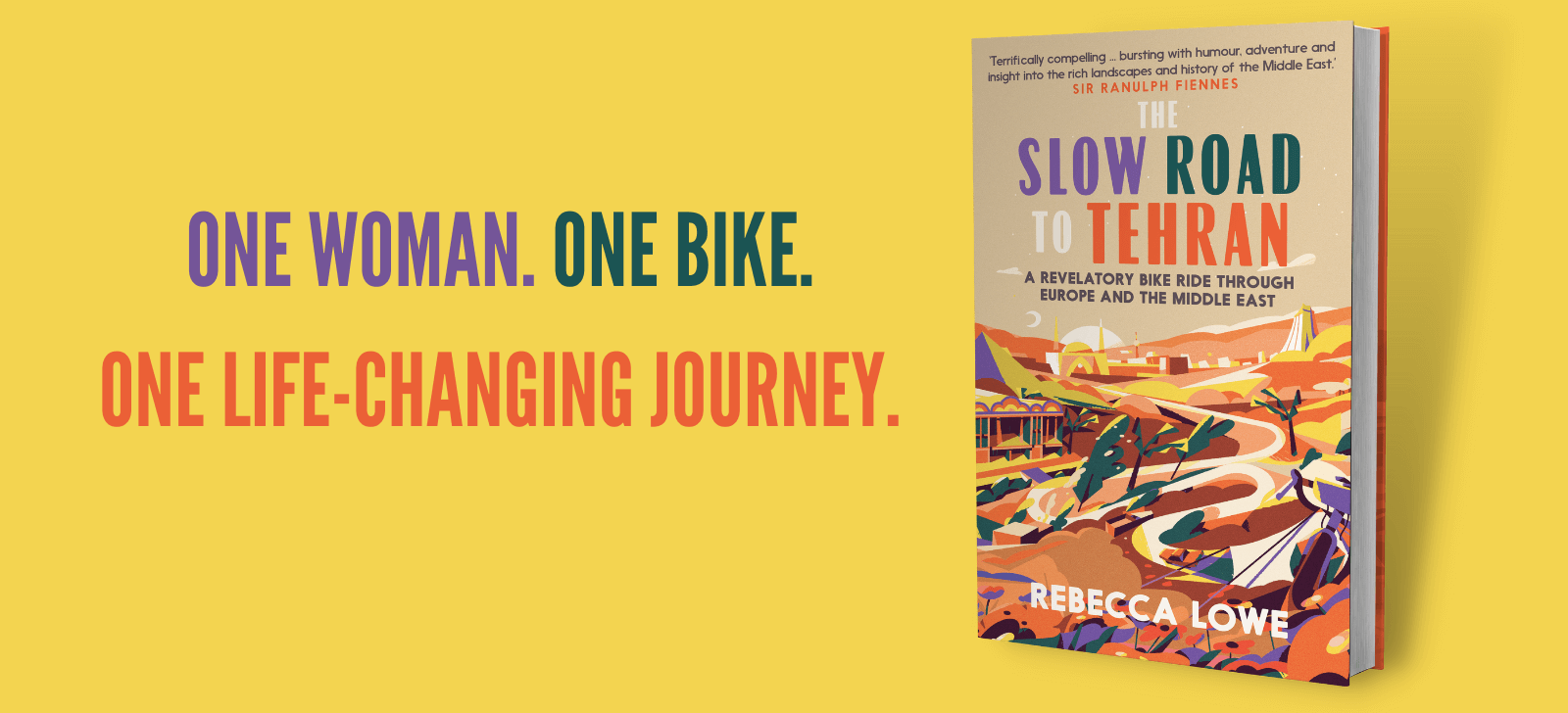By Rebecca Lowe - March 2022
Rebecca Lowe is a journalist who set out on a solo bike ride through Europe and the Middle East in 2015.
She pedaled through Turkey, Lebanon, Jordan, Egypt, Sudan, Gulf, Iran and more to dissect the difference between her experience.
Driven by a desire to learn more about this troubled region and its relationship with the West, Rebecca 11,000-kilometre journey
We are proud to consider Rebecca as an Arkel ambassador and encourage you to check out her book in which she shares her journey.
Below is an exclusive excerpt to give you a taste of her adventure.

Exclusive excerpt of her adventure!
Each day, bruised from the heat, I crave each rest-stop as a free diver craves air.
The roadside huts prove my salvation.
I soon develop a routine, rising before dawn and cycling until midday, before taking a lengthy break and continuing in the late afternoon.
At present, the cycling is manageable, but it is now early April and I admit I’m fearful of what’s to come.
In just a few weeks, the temperature will reach its peak and all but the sand snakes and scorpions will be seeking sanctuary from the sun’s bitter rays.
"Giving me solace in the meantime is the Nile."
Its power feels greater here even than in Egypt, for its banks are largely bare and there is little to distract the eye.
Broad and calm, it is the uncontested commander of this land, with a rawness of strength that grips and dizzies the soul.
Here, the river is not girdled and dammed like downstream but breathes slowly through the seasons: out in the summer months, as its belly expands to irrigate the riparian plains; in during winter, as it narrows and exposes the soil for new growth.
It is an antidote to so much out here that concerns me – sunstroke, thirst, loneliness, loss – and I find myself constantly searching for it between the endless brown below and endless blue above, as if only this mighty watercourse had the ability to hold these two infinite worlds apart.
- (cc: WaSZI)

"Near Abri, the Nile announces its presence with a shock of misty green."
I follow its bank in a broad westward arc, past tussocks of dry pastureland and a lone grazing mule, then turn off the main road and aim directly for it, delving into the foliage as if plunging into an emerald lake.
Bouncing across the sand, I pass a cluster of clay huts, a broken truck and a sleeping goat, before sliding to an unsteady halt beside a coppice of riverside palms.
Minutes later, careering into view in a cloud of black smoke, a clapped out old Morris Minor pulls up next to me. A tall, rakethin man unfolds like a concertina from the driver’s seat – which, like the rest of the car interior, is clad in an explosion of bright blue fur. ‘Sorry I late,’ he mumbles. ‘Car need petrol.’

The man, Mahjoub, unlocks a gate nearby and leads me into a beautiful adobe courtyard.
Built in the classic Nubian style, its ivory walls are decorated with clay pottery and woven wallhangings, while half a dozen doors around the perimeter lead into a series of charming bedrooms.
Mine contains a mahogany bed with blood-red satin sheets, a faded rug and, on the wall, the hide of what appears to be some kind of warthog or giant mongoose.
Outside the window, the Nile can be seen just metres away, its sandy bank now a deep coral-pink as if its capillaries were relaxing in the fading light of dusk.
Mahjoub is thirty-one and soft-spoken, with a sharp, darting eye.
Over a falafel sandwich, he tells me that he built the guesthouse after South Sudan seceded and he lost his job with the Malaysian oil giant Petronas.
‘I wanted it to be Nubian,’ he says. ‘Traditional. It’s important that we protect our culture.’ ‘You feel it’s under threat?’ He nods. ‘The Arabs have stolen it. Thousands of years ago, all this was ours.’
I look around. All I can see are a few crumbling huts and a donkey hollering like a creaky capstan. ‘This?’ ‘The desert. I show you. I take you to the Kajbar Dam.’
Later, he does as he says. Or perhaps it’s more accurate to say that I take him. Having accepted his offer to let me drive, I shuttle us across the sand, pounding dunes and ditches, dodging toddlers and goats.
The car has no speedometer or seatbelts, or brakes to speak of, and its metalwork seems held together through force of will alone.
To assist our safe passage, Mahjoub shrieks a stream of thunderous, hysterical instructions. ‘Gears! Accelerator! Clutch! Have you ever driven before?? Now braaaake!!!’
Ricocheting off a rock, we narrowly avoid plunging headfirst into the Nile as the engine, in a heroic act of harikari, issues a strangled groan and expires. It’s a relief for both of us.
Dying here would not only be ignominious, but preposterous.
"You don’t cycle halfway across the world to perish in a Morris Minor" plastered in blue fur.
‘Out, please,’ Mahjoub says, a little unkindly. ‘No more driving today.’
Author : Rebecca Lowe









